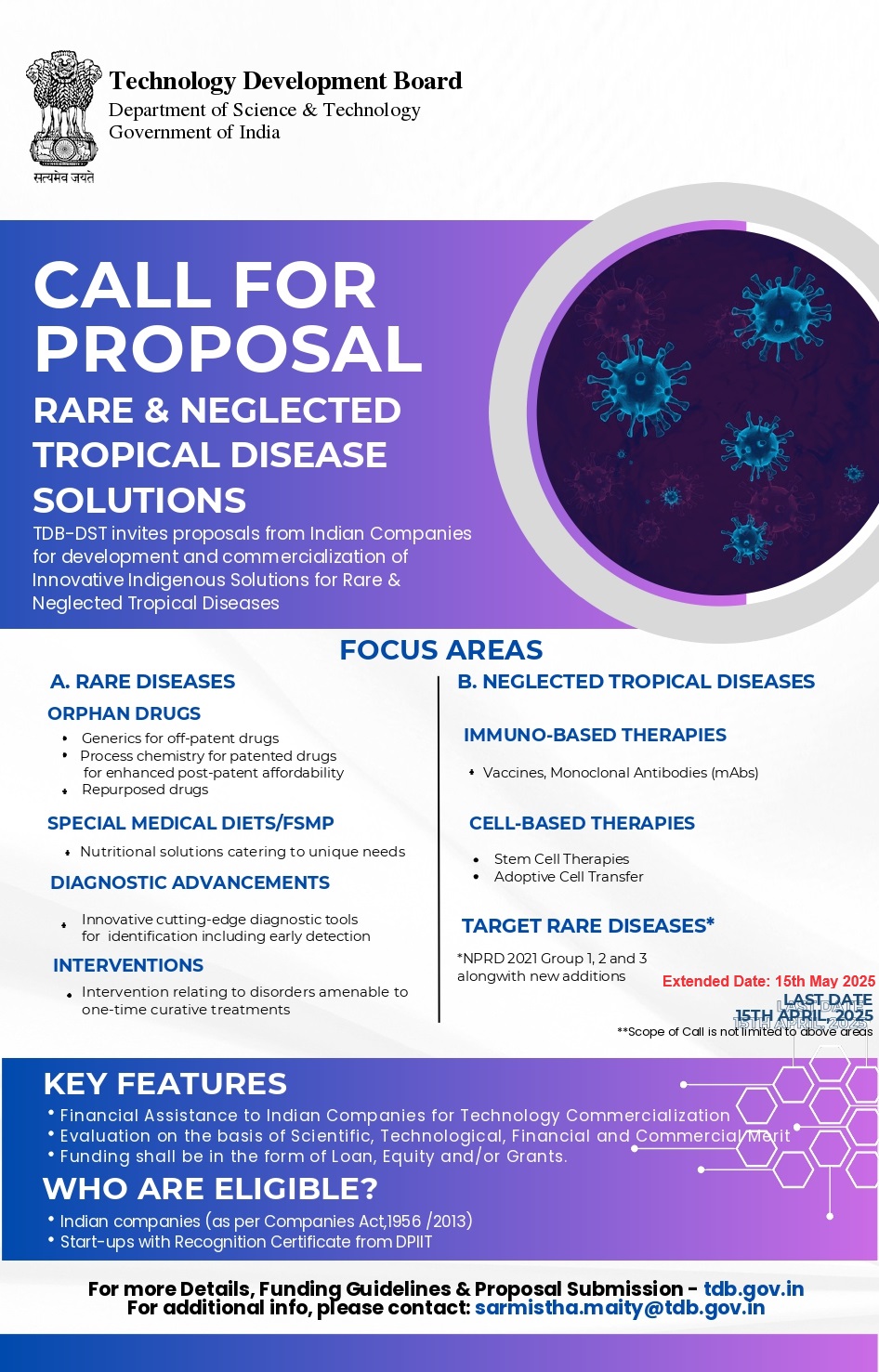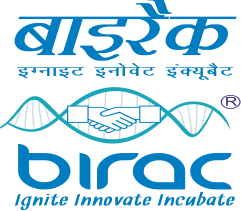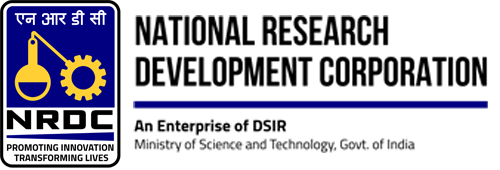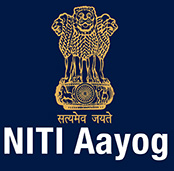Call for proposal “Rare and Neglected Tropical Disease Solutions"
1. RARE DISEASES:
Rare diseases are medical conditions that affect a very small number of people compared to more common illnesses. These diseases are uncommon and can vary widely in terms of symptoms and severity. Because they affect only a small portion of the population, they are often not as well-known or researched as more common diseases.
To be classified as a rare disease, the exact number of people affected can vary depending on the country, but generally, it's a disease that affects fewer than 1 in 2,000 people. Some rare diseases are genetic, meaning they are caused by changes in a person's genes, while others might be caused by infections, environmental factors, or unknown reasons. They are a public health concern in India, with an estimated burden of about 80 million cases. This is about one-fifth of the global burden.
2. Objectives:
The primary objectives of the Call for Proposals are as follows:
A: RARE DISEASE:
i. Orphan Drug Development: Encourage development and commercialization of orphan drugs that target specific rare diseases. Projects demonstrating strong scientific rationale, feasibility, and potential for commercial viability will be prioritized. Particular focus will be placed on:
- Developing and bringing to market generic drugs that have gone off-patent.
- Creating process chemistry for patented drugs to enhance affordability once their patents expire.
- Advancing the development and commercialization of repurposed drugs.
ii. Diagnostic Advancements: Support the creation and commercialization of advanced diagnostic tools and technologies designed for early and accurate detection of rare diseases. Projects that offer practical solutions and demonstrate scalability will be favored.
iii. Special Medical Diets/ Food for Special Medical Purposes (FSMP): Foster the development and commercialization of specialized medical diets tailored to the nutritional requirements of individuals with rare diseases. Emphasis will be placed on projects that offer safe, accessible, and sustainable dietary solutions.
iv. One-time interventions targeting Group 1 of NPRD 2021: Encourage the development and commercial scale production of medical devices/ equipments etc. essential for carrying out groundbreaking one-time treatments or procedures designed to provide lasting or permanent benefits, often addressing the root cause of the disease. These interventions can be life-changing for individuals with rare diseases, where traditional, ongoing treatments may not be feasible or effective.
Rare diseases that finds mention under Group1, 2 and 3 of the policy documents of NPRD 2021 (along with new additions) to be targeted for the proposals.

v. Encourage the development and commercial scale production of medical devices/ equipments etc. essential for carrying out groundbreaking one-time treatments or procedures designed to provide lasting or permanent benefits, often addressing the root cause of the disease. These interventions can be life-changing for individuals with rare diseases, where traditional, ongoing treatments may not be feasible or effective.
B: NEGLECTED TROPICAL DISEASES:
Immuno and cell-based therapies
Immuno- and cell-based therapies offer promising avenues for tackling neglected diseases, which often afflict populations in resource-limited settings and have historically received inadequate attention and funding. These therapies harness the body's immune system or utilize specialized cells to combat infectious agents or address underlying disease mechanisms. Here’s a brief overview of each approach:
Immuno-based Therapies:
(i) Vaccines: Traditional and novel vaccine approaches are crucial for preventing neglected diseases like malaria, tuberculosis, chicken guinea, Zika, Ebola etc. Vaccines stimulate the immune system to recognize and respond to pathogens, offering long-term protection.(ii) Monoclonal Antibodies (mAbs): Engineered antibodies can target specific components of pathogens or host proteins involved in disease processes. They are used for both treatment and prevention, offering targeted therapy against diseases like leishmaniasis and trypanosomiasis.
Cell-based Therapies:
(i) Stem Cell Therapies: Stem cells hold potential for regenerative medicine in neglected diseases. They can replenish damaged tissues and modulate immune responses, aiding in conditions such as leprosy or Buruli ulcer where tissue destruction is prominent.
(ii) Adoptive Cell Transfer: This involves transferring immune cells, such as cytotoxic T cells or natural killer cells, into patients to enhance their immune response against pathogens. This approach shows promise in diseases like leishmaniasis and leprosy.
Both immuno- and cell-based therapies are advancing through research and clinical trials, aiming to overcome challenges such as variability in disease presentation, host immune responses, and pathogen diversity. These therapies not only provide new treatment options but also contribute to preventive strategies crucial for controlling neglected diseases globally. Continued innovation and investment are essential to fully realize their potential and address the health disparities associated with neglected diseases.
Proposals should align with one or more of the following focus areas:
- Development of novel cell therapies for neglected tropical diseases.
- Advancement of immunotherapy solutions for infectious diseases prevalent in underserved regions.
- Integration of innovative technologies to enhance efficacy and delivery of therapies in resource-limited settings.
3. Scope:
Established industry as well as startups incorporated under the Companies Act, 1956/2013 (for profit companies only), are encouraged to submit proposals showcasing innovative technologies for development and commercialization.
All solutions/products requiring clinical trials must have successfully completed Phase I by the time of application submission
For queries and further details contact:
Dr. Sarmistha Maity
Sr. Project Coordinator
Email: sarmistha.maity@tdb.gov.in
Contact: 011-26511184
Start Date: - 15th January 2025
Last date: - 15th April 2025
Extended Date : 15th May 2025








